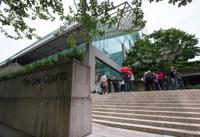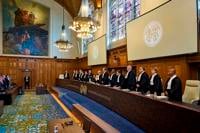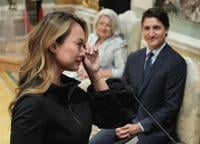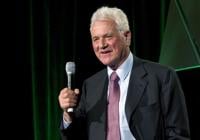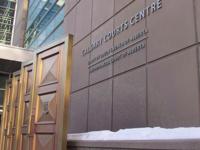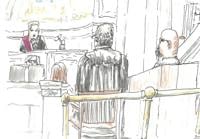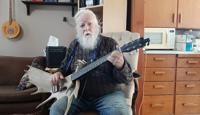VANCOUVER - The 13-year-old girl who Ibrahim Ali is accused of murdering in a British Columbia park wasn't the "innocent" depicted in a "rose-coloured" portrayal by the Crown at trial, and may have found Ali attractive, his lawyer says.
Kevin McCullough told a B.C. Supreme Court jury in his closing arguments that the version of the girl's lifestyle presented by the Crown is "at best, a partial picture" or "at worst, a lie."
He said Crown witnesses who could speak to her character, including the girl's mother, were often not the closest people to the girl and were often contradictory in their testimony about her behaviour.
He said the jury heard testimony that the girl often avoided her mom's phone calls, liked to "endlessly ride SkyTrain" alone and sometimes fell asleep in the park.
McCullough said Thursday that Crown witnesses amounted to advocates, which he said was clear from the fact that several referred to her as a child and this was an effort to "play on (their) emotions."
"She (was) a teenager," McCullough emphasized again Friday, noting she was 13 years and nine months old at the time of her death.
The body of the teen, who can't be named because of a publication ban, was found in a Burnaby, B.C., park in July 2017, just hours after her mother reported her missing.
Ali pleaded not guilty to first-degree murder at the start of the trial in April.
McCullough said the only evidence the Crown had against Ali was his semen found inside the girl's body.
The Crown had come up with a "crazy theory" where no one saw or heard anything connecting Ali to the murder, he told the jury.
Crown attorney Daniel Porte finished closing arguments Thursday saying it had been proved beyond a reasonable doubt that Ali dragged the girl into a wooded area of the park, sexually assaulted her, then killed her.
"When you strangle someone for a minimum of two minutes and for most of that time, the person is unconscious, it can only be for one reason: to kill them or cause bodily harm you know is likely to kill them," he said of Ali.
Porte spent about two hours summarizing evidence from more than four dozen Crown witnesses. He referred to the crime scene and how the girl's body was found as well as testimony from Christine Crossman, an RCMP forensic biologist, who said Ali's DNA was found inside the body of the girl.
McCullough called the Crown's theory "overly speculative," saying there was no evidence to prove its proposed sequence of events.
"It is a garbage theory and it's all they've got," he told the jury.
McCullough said there were no "drag marks" from the path into the forest and a "lack of witnesses."
He said it is unlikely that no one would have heard or seen a struggle. He said the trial heard how about 10 to 12 officers had gone to canvass for witnesses in the park a week later, during the same time they believe the girl died, but could not keep up with the crowds.
"One thing after another doesn't add up," McCullough said.
He said the Crown's case rests on the belief it would have been out of character for the teen to have sex with Ali.
"I don't think its outlandish to suggest that (she) may have found him attractive," McCullough said.
"I emphasize, ladies and gentleman, how little you know about either of them and how little any of us can really know about personal lives."
He pointed again to the lack of defensive wounds found on the girl's body.
"No defensive wounds is consistent with consensual non-forced sex. Defensive wounds (are) consistent with a struggle," McCullough said.
McCullough told the jury Thursday that the Crown had not proved its case and that the jury could not find Ali guilty of murder simply because he "had sex" with the girl.
On Friday, he said it is not reasonable to conclude the two did not know each other, noting that the Crown only presented cellphone records at trial.
He suggested Ali and the girl could have communicated through other means, including social media apps.
"We don't even know what apps she had on her phone" he said.
WATCH GRAPHIC CONTENT
Porte told the jury Thursday that forensic pathologist Dr. Jason Morin, who conducted the autopsy, had testified that fluid is subject to gravity, and had the girl stood afterward, the semen would run out of the body and onto her underwear and shorts.
McCullough told the jury Morin testified to taking many swabs from the girl's body that tested positive for Ali's DNA.
He said the external vaginal swab that tested positive meant it was possible that semen had leaked out with gravity.
McCullough noted that police only tested a small number of the swabs the pathologist took from the girl's body.
He argued police chose not to test any of the other swabs or her underwear because they had their theory and "they didn't want any other evidence."
McCullough disputed the Crown's theory of the crime and said the "stronger inference" is that "the body was dumped where it was found, probably hours later in the cover of night."
He said the forensic pathologist told the trial that he could not say whether the girl was "brought to the park dead or alive" or "whether she was killed where her body was found."
"You can't convict someone when such glaring questions exist on the evidence," he told the jury.
Justice Lance Bernard told the jury Friday he will give his final instructions to the jury before members begin their deliberations.
This report by ´ºÉ«Ö±²¥was first published Dec. 1, 2023.


